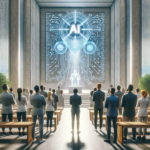Welcome to the newest edition of FindBiometrics’ AI update. Here’s the latest big news on the shifting landscape of AI and identity technology:

A group of Western and Chinese AI scientists has published a joint statement warning that international cooperation will be needed to avoid “catastrophic or even existential risks to humanity within our lifetimes.” The group identified multiple “red lines” that must not be crossed, including the development of AI systems to design weapons of mass destruction, and allowing AI systems to autonomously copy or improve themselves, among others.
The United Nations General Assembly has approved a non-binding resolution calling for the development of “safe, secure and trustworthy” AI systems. The proposal was co-sponsored by 110 countries, and passed by consensus, without a formal vote. It does not address military applications of AI.
Nvidia has unveiled its new Blackwell GPU, which has 208 billion transistors, compared to the 80 billion transistors of its popular predecessor, the H100. Nvidia says the new chip is twice as powerful for training AI models, and that it is five times better at inference, a term referring to the speed of responses to user input.
Microsoft has effectively acquired the startup Inflection AI, which has been working on Large Language Models. On paper, it’s not an acquisition. But Microsoft hired two of the startup’s co-founders and most of its staff, and agreed to pay about $650 million to company, mainly through a licensing agreement.
OpenAI competitor Cohere was making about $13 million in annualized revenue at the end of last year, according to The Information. The company has raised $445 million in investment funding. OpenAI, meanwhile, reached annualized revenues of $2 billion in December.
Tennessee has passed legislation banning the AI-based replication of recording artists’ voices without their consent. It is one of three states in which someone’s likeness is considered a property right, rather than a right of publicity. The Ensuring Likeness, Voice, and Image Security Act is slated to take effect on July 1, 2024.
Midjourney has debuted a “character consistency” feature that allows users of the image generation tool to reuse the same AI-generated character in multiple images, rather than the default system of generating entirely new characters for each image prompt. In other words, the same synthetic person can be shown in various poses and scenarios, on demand. The development was discussed in FindBiometrics’ 2024 Year in Review event.
The chatbot’s take: This week we’re leaning on ChatGPT for business expertise.

–
March 21, 2024 – by Alex Perala








Follow Us